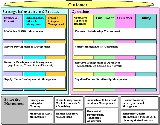
ETOM
Encyclopedia
The eTOM published by the TM Forum
, is a guidebook that defines the most widely used and accepted standard for business processes in the telecommunication
s industry. The eTOM model describes the full scope of business processes required by a service provider
and defines key elements and how they interact.
eTOM is a common companion of ITIL
, an analogous standard or framework for best practices in information technology
. Both of these frameworks are part of the larger context of Total Quality Management
, in which many industries have, since 1950, increasingly formalized their business processes and metrics in search of higher quality, fewer defects, and greater efficiency. ISO 9000
is probably the best-known of these "process and results improvement" standards, but it is far more generic than either eTOM or ITIL.
eTOM has been adopted by ITU-T
as a Recommendation and published in the M.3050.x series.
The graphic representation of an eTOM model consists of rows and columns, the intersections of which denote specific business processes. The top row includes customer facing activities such as marketing, while the bottom row includes supplier facing and support activities. In this manner the eTOM map covers the whole value chain. The map also indicates the interaction between processes.
eTOM processes fall into three broad sections: Strategy, Infrastructure & Product, Operations, and Enterprise Management, as shown in the following diagram.
Strategy, Infrastructure & Product:
Operations
TM Forum
The TeleManagement Forum formerly the Network Management Forum, is an international non-profit industry association, for service providers and their suppliers in the information industry, the telecommunications industry and the entertainment industry.Members include telephone companies, cable...
, is a guidebook that defines the most widely used and accepted standard for business processes in the telecommunication
Telecommunication
Telecommunication is the transmission of information over significant distances to communicate. In earlier times, telecommunications involved the use of visual signals, such as beacons, smoke signals, semaphore telegraphs, signal flags, and optical heliographs, or audio messages via coded...
s industry. The eTOM model describes the full scope of business processes required by a service provider
Service provider
A service provider is an entity that provides services to other entities. Usually, this refers to a business that provides subscription or web service to other businesses or individuals. Examples of these services include Internet access, Mobile phone operators, and web application hosting...
and defines key elements and how they interact.
eTOM is a common companion of ITIL
Information Technology Infrastructure Library
The Information Technology Infrastructure Library , is a set of good practices for IT service management that focuses on aligning IT services with the needs of business. In its current form , ITIL is published in a series of five core publications, each of which covers an ITSM lifecycle stage...
, an analogous standard or framework for best practices in information technology
Information technology
Information technology is the acquisition, processing, storage and dissemination of vocal, pictorial, textual and numerical information by a microelectronics-based combination of computing and telecommunications...
. Both of these frameworks are part of the larger context of Total Quality Management
Total Quality Management
Total quality management or TQM is an integrative philosophy of management for continuously improving the quality of products and processes....
, in which many industries have, since 1950, increasingly formalized their business processes and metrics in search of higher quality, fewer defects, and greater efficiency. ISO 9000
ISO 9000
The ISO 9000 family of standards relates to quality management systems and is designed to help organizations ensure they meet the needs of customers and other stakeholders . The standards are published by ISO, the International Organization for Standardization, and available through National...
is probably the best-known of these "process and results improvement" standards, but it is far more generic than either eTOM or ITIL.
eTOM has been adopted by ITU-T
ITU-T
The ITU Telecommunication Standardization Sector is one of the three sectors of the International Telecommunication Union ; it coordinates standards for telecommunications....
as a Recommendation and published in the M.3050.x series.
Description
The eTOM model consists of Level-0, Level-1, Level-2 and Level-3 processes. These levels form a hierarchy, with each level encapsulating a group of processes at the next level of detail.The graphic representation of an eTOM model consists of rows and columns, the intersections of which denote specific business processes. The top row includes customer facing activities such as marketing, while the bottom row includes supplier facing and support activities. In this manner the eTOM map covers the whole value chain. The map also indicates the interaction between processes.
eTOM processes fall into three broad sections: Strategy, Infrastructure & Product, Operations, and Enterprise Management, as shown in the following diagram.
Strategy, Infrastructure & Product:
-
- Columns
- Strategy and Commit, Infrastructure Lifecycle Management and Product Lifecycle Management
- Rows
- Marketing & Offer Management, Service Development & Management, Resource Development & Management and Supply Chain Development & Management
Operations
-
- Columns
- Operations Support & Readiness, Fulfillment, Assurance and Billing
- Rows
- Customer Relationship Management, Service Management & Operations, Resource Management & Operations and Supplier/Partner Relationship Management.

